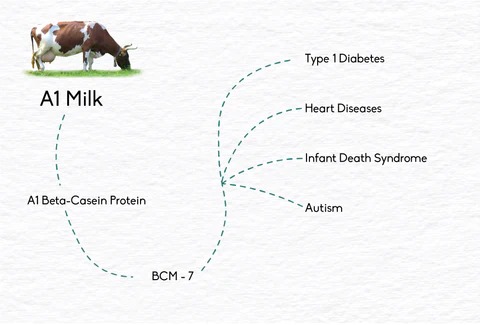
Exploring the Choice of Cow Milk: A Personalized Guide to Dairy Consumption...
There is widespread recognition of the long-held belief in the nutritional completeness and health advantages of milk. There are two main types of cow milk available nowadays: A1 and A2. The inherent dangers and benefits of these types vary greatly. A2 milk, which is generated by historic cow breeds, and A1 milk, which is more common, are both commended for their enhanced digestibility and possible health benefits. This information will help you make an informed decision for your personal health journey by outlining the differences between A1 and A2 cow milk.
Caseins and whey proteins make up the majority of the proteins found in milk. Alpha-caseins, one type of casein, are essential for the structure of milk, particularly for the creation of micelles that carry calcium and phosphate. The amount of alpha-casein subtypes in milk varies throughout breeds of cattle.
These proteins’ makeup affects not just the way milk is shaped, but also how cheese and other dairy products are made, which has an effect on yield and quality. Moreover, some casein variations have been connected to allergies and intolerances; people react differently to different kinds.
Native to the Gir forests of South Kathiawar, Gujarat, traditionally prized native dairy cattle breeds like Desan, Vechur, Gujarati, Kathiawari, Sorthi, and Surati have a reputation for producing A2 milk. This specific kind of milk has been a mainstay in the local inhabitants’ diets, praised for its health advantages in Ayurvedic treatments.
Unlocking the Alpha 2 Advantage: Why A2 Milk is a Superior Health Choice

Because A2 milk only contains the A2 form of beta-casein protein, it has gained attention as a potentially healthier alternative to regular cow’s milk. Supporters of this viewpoint claim that A2 milk has several health advantages, such as improved nutritional value, simpler digestion, and a lower chance of pain.
One common explanation for the digestibility of A2 milk is because it lacks A1 beta-casein, which breaks down during digestion to release a peptide called beta-casomorphin-7 (BCM-7). Type 1 diabetes, heart disease (which may exacerbate oxidative stress and inflammation in the cardiovascular system), digestive problems (like lactose intolerance or IBS), and neurological disorders (which may exacerbate symptoms in people with autism or schizophrenia) have all been linked to BCM-7.
For those who are sensitive to specific milk sensitivities, selecting the A2 variety may result in a lower chance of discomfort (excluding lactose intolerance). Because A2 milk does not include BCM-7, preliminary study suggests that it may provide additional health benefits over ordinary milk, potentially influencing issues like inflammation and cardiovascular health.
Navigating A1 Milk: Distinguishing Reality from Myths and Grasping the Potential Risks

Concerns have been expressed about the focus on Beta-casomorphin-7 (BCM-7), as there have been complaints of digestive problems such gas, bloating, and abdominal pain after consuming A1 milk. Although BCM-7 is frequently linked to these symptoms, it is yet unclear if these symptoms are common or simply impact select groups of people who have particular sensitivity.
Notwithstanding these reservations, it’s important to recognize that A1 milk provides the same nutritional advantages as conventional cow’s milk, being an excellent source of calcium, protein, and other vitamins.
There are conflicting results from the continuing studies on the connection between consuming cow’s milk, especially the A1 protein, and a number of health problems. According to certain research, children who are exposed to cow’s milk protein at a young age may be more likely to develop type 1 diabetes, particularly if they consume more milk. All research does not, however, consistently find this link.
According to a well-known study on mice, there may be a connection between A1 protein and diabetes; 47% of mice given A1 protein vs those given A2 protein developed diabetes. On the other hand, data from several studies refutes this, demonstrating no meaningful link between drinking milk and a higher risk of type 1 diabetes.
Research on the effects of milk on cholesterol and brain function has produced a variety of results, extending beyond diabetes. One study found that when ordinary milk was consumed instead of A2 milk, information processing slowed down and mistakes increased. Furthermore, consuming A1 protein was associated with higher cholesterol levels in a small-scale rabbit investigation; however, human conclusions cannot be extrapolated from these data.
Many studies have not discovered any link between higher milk consumption and higher incidence of heart disease, despite theories pointing to a link between consumption of A1 protein and heart disease. Overall, although some research suggests that the A1 protein may have health effects, the data is still equivocal, highlighting the need for further thorough research to completely understand these links.
Empowering Your Milk Choices with Informed Decision-Making

Making an educated choice about milk consumption entails researching the various kinds of milk that are available, appreciating their nutritional profiles, being aware of any possible health risks, and matching them to your dietary requirements and tastes.
The combination of A1 and A2 beta-casein proteins found in conventional cow’s milk makes it a great source of calcium, protein, vitamins B12 and D, and other minerals. However, some people believe that A2 milk, which only contains A2 beta-casein, is simpler to stomach. Reports indicate that the nutritional advantages of both varieties are essentially unchanged in spite of this difference.
Alpha-2 Milk Powder Formula for Young Ones
Alpha-2 milk powder formula is specially made for babies and kids who might be allergic to regular cow’s milk formula. This unusual blend mostly contains casein protein of the alpha-2 variety, which comes from particular breeds of cows. It is designed to be more easily digested and does not contain the alpha-1 casein protein that is present in standard formulae. The foundation of this design is the idea that alpha-2 casein is a better option for kids who have sensitivity to regular cow’s milk formula since it is kinder and possibly less allergic.
Like other baby formulae, alpha-2 milk powder offers vital nutrients that are necessary for healthy growth and development. It does, however, cater to individuals who would benefit from a more soluble type of milk protein, making it a good choice for parents looking for a formula that meets their child’s particular dietary needs.



